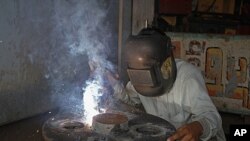A series of interest rate hikes is beginning to take a toll on the Indian economy. The rate increases have slowed economic growth and dampened business confidence.
Second quarter economic growth, from April to June, fell to 7.7 percent compared to 8.8 percent during the same period last year. But the numbers have caused little surprise.
Economists have been warning that 11 interest rate hikes in the last year and a half by the Central Bank would stunt economic growth.
The interest rate hikes are meant to curb inflation, which the Central Bank says is a greater challenge to the economy than a marginal slowdown. In fact, yet another rate hike is expected this month because inflation continues to remain above nine per cent.
For an economy that has been surging in recent years, the interest rate hikes are dampening optimism. A recent survey by the Federation of Indian Chambers of Commerce and Industry said business confidence has slumped to a two-year low as companies are rattled by a slowing domestic and global economy.
D.H. Pai Panindiker, an economist at the RPG Goenka Foundation, says investment has slowed in recent months. “The high rate of interest itself knocks down many profitable projects. Lucrative projects become non viable. Apart from that industry cannot raise capital because the share market has been bearish. Since January, share prices have come down by nearly 13 to 14 percent. That makes it difficult for companies to raise new capital,” Panindiker stated.
The worst-hit sectors are construction and automobile manufacturing, as higher interest rates have dampened demand for houses and cars.
Businesses are also concerned with what observers call a “policy paralysis” in the government. Preoccupied with defusing a widespread anti-corruption protest movement, the government has failed to move forward with long-awaited economic reforms that would attract more foreign investment and give business a boost.
Economist Panindiker says there are concerns about the future. “The mood now is not very cheerful... As far as the common man is concerned he is worried about inflation, as far as industry is concerned, they are worried about growth and investment,” Panindiker stated.
India is Asia’s third biggest economy and had emerged virtually unscathed from the 2008 financial crisis. But the recent dip in growth is causing some worry, particularly amid mounting fears of a new global slowdown.
Interest Rate Hikes Take Toll on Indian Economy












